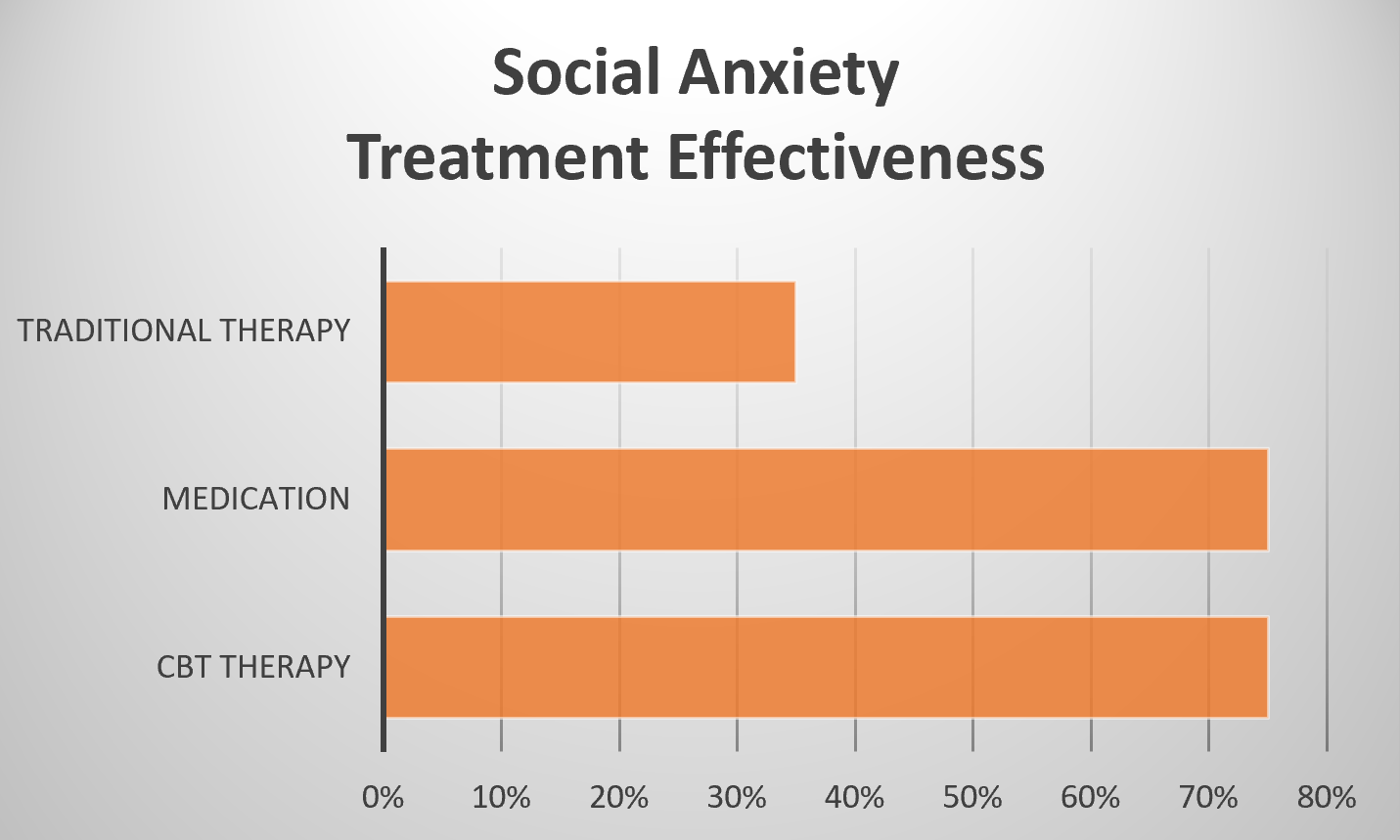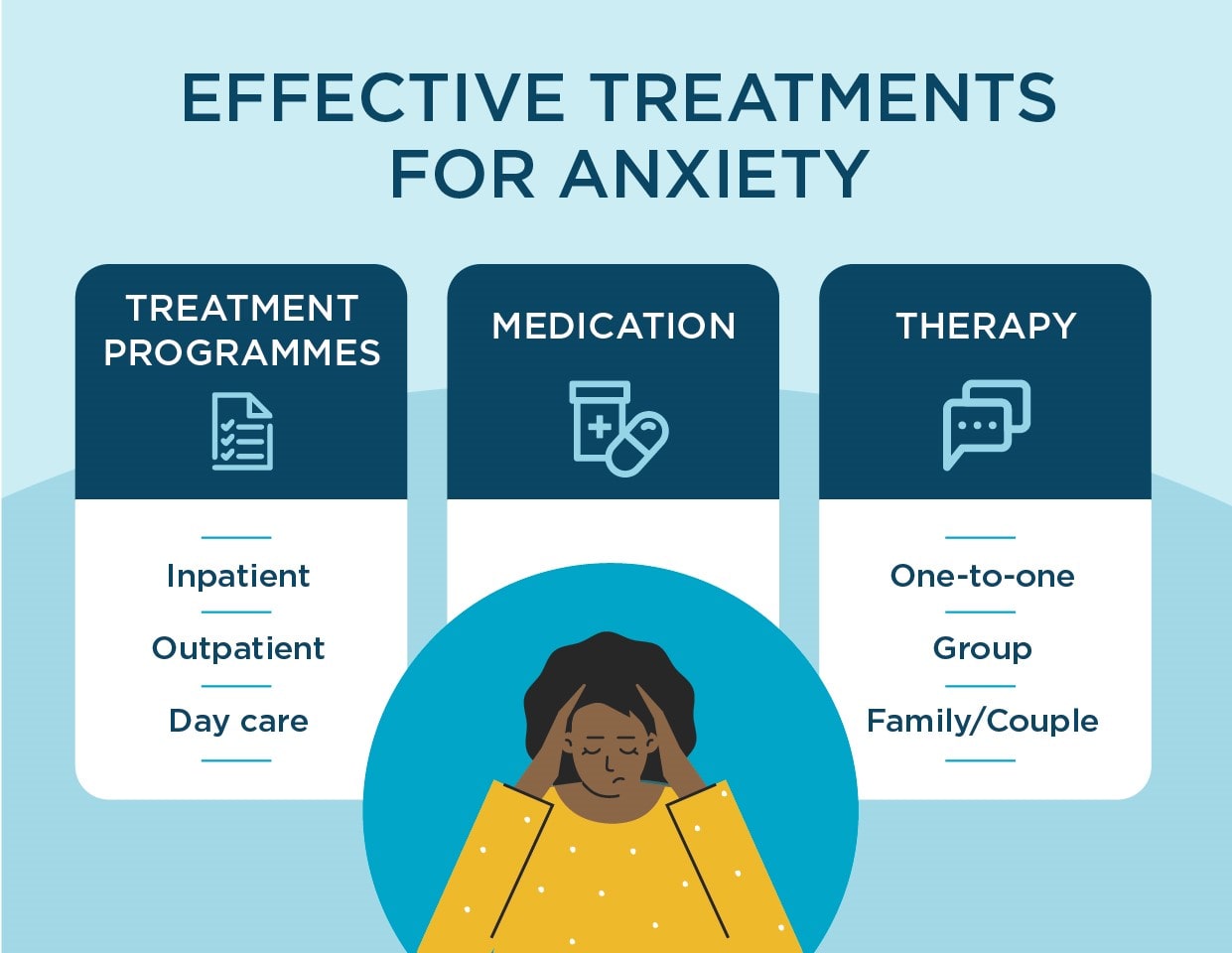Discover meaningful relief with a licensed therapist for anxiety you can trust
Discover meaningful relief with a licensed therapist for anxiety you can trust
Blog Article
Exploring Various Strategies in Therapy for Anxiety Disorder for Long Lasting Change
When tackling stress and anxiety conditions, it's important to explore a selection of therapy strategies. Each technique supplies distinct understandings and tools to assist you manage your symptoms efficiently. You could locate that incorporating methods can generate the most effective outcomes. However, understanding the nuances of these techniques is crucial to cultivating long lasting change. What if the appropriate combination could release a new degree of emotional well-being for you?
Recognizing Stress And Anxiety Problems: A Short Introduction
Anxiety conditions, which impact numerous people worldwide, can substantially influence life. You might experience frustrating sensations of concern or stress that seem uncontrollable. These sensations can lead to physical symptoms like an auto racing heart, sweating, and even wooziness. Typical kinds of anxiousness disorders include generalized anxiety disorder, panic condition, and social anxiousness condition. Each has one-of-a-kind signs, however they all share a propensity to interrupt your routine and relationships.Understanding the source of your anxiety is vital. It might originate from genes, mind chemistry, or life experiences. Acknowledging your triggers can aid you handle your feedbacks much better. It is very important to keep in mind that you're not alone in this struggle. Lots of people face comparable obstacles, and looking for aid is a strong action toward sensation much better. By learning concerning stress and anxiety disorders, you're currently on the course to understanding and managing your condition better.
Cognitive-Behavioral Therapy: Challenging Negative Thought Patterns
In Cognitive-Behavioral Treatment, you'll start by determining the unfavorable thought causes that contribute to your anxiety. You'll work on replacing them with more favorable options once you identify these ideas. With each other, you'll build effective coping techniques to help manage your anxiousness in daily circumstances.
Recognizing Adverse Thought Triggers

Recognizing the specific triggers behind your negative thoughts can be crucial in handling anxiety when you encounter minutes of distress. Begin by focusing on situations that prompt sensations of worry or fear. Is it a congested area, a future due date, or a conversation with certain people? Write down these circumstances in a journal. This will certainly help you determine patterns in your reasoning. Additionally, notice physical experiences that accompany your negative thoughts, like a racing heart or tightness in your upper body. By pinpointing these triggers, you acquire insight into what's sustaining your anxiety. Understanding these connections is the primary step in testing those ideas and ultimately reclaiming control over your emotional feedbacks.
Replacing Thoughts With Positives
Testing negative thought patterns is an essential action in changing your frame of mind and reducing anxiousness. You might commonly discover on your own caught in cycles of insecurity or disastrous reasoning. As opposed to letting these thoughts determine your sensations, method replacing them with positive affirmations or sensible options. When you assume, "I can't manage this," change it to, "I can handle challenges one step at a time." This basic change can greatly influence your mood. Regularly determining and responding to these adverse thoughts aids create a much healthier internal discussion. Keep in mind, it requires time and effort, however regularly exercising this technique can bring about enduring change, encouraging you to encounter anxiousness with restored confidence and strength.
Structure Coping Approaches With Each Other
Changing unfavorable thoughts is only the beginning of taking care of anxiety properly. To create long lasting modification, you need to develop coping strategies that empower you. Cognitive-Behavioral Therapy (CBT) assists you determine and challenge those purposeless thought patterns. With each other, you and your counselor can explore just how these thoughts impact your feelings and behaviors.Start by developing practical strategies, like journaling or mindfulness workouts, that allow you to challenge anxiousness head-on. When you encounter your concerns gradually, you'll learn to react in different ways.

Mindfulness and Acceptance-Based Approaches: Growing Present-Moment Understanding
As you navigate the intricacies of stress and anxiety, integrating mindfulness and acceptance-based strategies can significantly boost your capability to grow present-moment understanding. By concentrating on the right here and currently, you'll locate that you can observe your thoughts and sensations without judgment (Counseling services for anxiety). This practice helps you recognize your anxiety without feeling bewildered by it.Engaging in mindfulness workouts, such as deep breathing, body scans, or directed meditations, allows you to ground yourself in your existing experience. Acceptance-based methods motivate you to welcome your emotions instead than deal with versus them. When you approve your feelings, they shed their power over you.Incorporating these methods into your everyday regimen can change how you reply to anxiety. You'll develop strength and learn to navigate demanding circumstances with better convenience. Inevitably, growing present-moment recognition lays the foundation for long lasting modification, equipping you to lead a much more meeting life
Exposure Treatment: Challenging Anxieties Gradually
Direct exposure therapy aids you face your fears in a steady way, making it much less overwhelming. You'll find out methods to encounter anxiety-provoking circumstances detailed, while additionally developing coping methods to manage your responses. This strategy encourages you to take control and minimize stress and anxiety gradually.
Progressive Direct Exposure Strategies

When dealing with anxiety, gradually challenging your worries can be a powerful means to regain control. This strategy, recognized as steady exposure, involves slowly subjecting yourself to the circumstances or items that trigger your stress and anxiety. Begin with less intimidating scenarios and gradually work your means as much as more difficult ones. If you're worried of public speaking, you could start by speaking in front of a mirror, then proceed to sharing thoughts with a good friend, and eventually deal with a tiny group. Each step assists desensitize you to the anxiety, building your self-confidence with time. Remember, it's essential to pace yourself and commemorate tiny victories as you move with this procedure, reinforcing your capacity to manage stress and anxiety properly.
Building Coping Approaches
Structure efficient coping strategies is essential for taking care of stress and anxiety, specifically as you confront your fears slowly - Counseling services for anxiety. One powerful approach is direct exposure treatment, where you start by facing your worries in a regulated manner. Start with less intimidating circumstances and slowly work your means up to more challenging situations. This steady exposure aids desensitize you to stress and anxiety causes, making them much less overwhelming.Incorporate leisure techniques, such as deep breathing or mindfulness, to relax your mind during direct exposure. Track your development, commemorating little victories along the road to improve your confidence. Bear in mind, it's alright to take your time; the goal isn't perfection but stable improvement. By building these techniques, you'll empower on your own to browse stress and anxiety and accept life much more completely
Psychodynamic Therapy: Revealing Root Causes of Anxiety
Psychodynamic treatment discovers the subconscious mind, exposing the origin of your anxiety. By examining your thoughts, feelings, and previous experiences, this technique aids you reveal underlying problems and unsolved issues that might add to your present anxiety. You'll work with a therapist to investigate childhood years experiences, partnerships, and emotional patterns that form your actions today.As you gain understanding into these deeper layers of your subconscious, you'll start to recognize just how past occasions affect your existing actions. This understanding can result in catharsis, allowing you to process emotions you might have suppressed.Through the therapeutic partnership, you can likewise determine defense systems that might have developed gradually, supplying a clearer course to change. Inevitably, psychodynamic therapy furnishes you with the devices to address your anxiousness website at its core, promoting enduring transformation in your emotional health.
Holistic and integrative Approaches: Integrating Techniques for Greater Efficiency
Integrating various restorative techniques can enhance your journey towards taking care of anxiety better. By integrating components from cognitive-behavioral therapy, mindfulness methods, and alternative strategies, you can develop a customized method that resolves your one-of-a-kind needs. As an example, you may utilize cognitive-behavioral methods to test adverse idea patterns while incorporating mindfulness exercises to ground yourself in the present moment.Additionally, checking out alternative techniques such as yoga exercise or reflection can advertise relaxation and decrease stress and anxiety signs and symptoms. This blend allows you to develop greater self-awareness and resilience.Experimenting with these diverse approaches can aid you find what reverberates most with you. Keep in mind, it's regarding locating a harmony that works, instead of adhering to a single approach. This integrative method not just provides prompt relief however additionally cultivates lasting abilities for taking care of anxiety, equipping you to recover control over your life.
The Role of Assistance Solutions: Building Strength With Link
While it may seem that taking care of anxiousness is a solitary trip, having a strong support system can play an essential duty in your durability. Bordering on your own with empathetic friends, family members, or support system creates a secure area where you can openly share your experiences and feelings. You remind on your own that you're not alone in this struggle.These relationships use encouragement and can supply practical coping methods that have actually worked for others when you attach with others. It's also an opportunity to gain point of view; friends can assist you see scenarios in a different way, lowering feelings of isolation.Moreover, psychological support promotes a feeling of belonging, which can significantly ease anxiety signs. By leaning on your support system, you can develop durability and take on challenges better. Keep in mind, reaching out for help signifies strength, and it can make all the difference in your journey towards taking care of anxiousness.
Frequently Asked Questions
What Are the Typical Signs of Anxiety Conditions?
You may experience uneasyness, tiredness, trouble focusing, impatience, muscular tissue stress, and rest disruptions. Physical signs and symptoms can consist of quick heartbeat, sweating, and shivering. Recognizing these signs early can help you seek appropriate support and treatment.
How Long Does Therapy Usually Last for Stress And Anxiety Problems?
Treatment for stress and anxiety conditions commonly lasts anywhere from a couple of weeks to numerous months. It actually depends upon your specific requirements, development, and the methods your therapist uses to help you manage your anxiety efficiently.
Can Medicine Be Utilized Together With Treatment for Stress and anxiety?
Yes, medicine can definitely be made use of along with treatment for anxiety. Combining both techniques typically improves treatment effectiveness, aiding you handle signs while discovering underlying problems via therapy (Counseling services for anxiety). Always consult your doctor for customized guidance
Are There Self-Help Strategies for Taking Care Of Anxiety?
Yes, there are numerous self-help approaches for handling stress and anxiety. You can exercise mindfulness, take part in regular workout, preserve a balanced diet plan, develop a routine, and make use of deep breathing strategies to help minimize anxiousness symptoms successfully.
Just how Do I Know if I Required Expert Assistance for Anxiousness?

Report this page